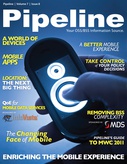 Pipeline Publishing, Volume 7, Issue 8
Pipeline Publishing, Volume 7, Issue 8 |
 |
This
Month's Issue: |
Enriching the Mobile Experience |
|
|
|
A Better Mobile Experience through Managing People, Process, and Technology
|
|
|
|
|
|
|

By
Fareed Khan
The holiday season has drawn to a close, and while many consumers may have sworn
off shopping as a new year’s resolution, chances are that resolution won’t last
long, and most will be back in the mall or online with wallet in hand. For
mobile operators, a valuable resolution may be to look at those shopping
tendencies and habits, and apply those insights to their marketing strategies in
the new year.
In the “old days,” shopping meant multiple visits to multiple stores, such as
the produce market for fruits and vegetables, the butcher shop for meat, and the
general store for milk and bread. Today, consumers expect to be able to do all
their weekly grocery shopping in a single place, in a supermarket that stocks a
wide range of products. A similar trend has emerged online, with online shoppers
generally preferring the convenience of a site such as Amazon or Café Press that
provides multiple products from a range of suppliers through a single storefront
and payment system.
|
|
Operators can take an incremental approach without embarking on a full-scale back office transformation by investing in a few key systems. |
|


 Evaluating Our Strengths
Evaluating Our Strengths
Retail consumers aren’t likely to
tolerate that lack of flexibility. Over
time, mobile subscribers will become
less tolerant, particularly in competitive
|
|
|
|
|

Mobile operators must adopt this model to successfully remain competitive while
increasing revenue per user. Just as the convenience of having a single
storefront—both brick-and-mortar and online for multiple goods-- has prompted
the emergence of superstores, the communications market is moving toward a
similar model, in which an operator can act as a single source for multiple
products and services for its subscribers—both its own and those of its
partners.
But adopting that model is easier said that done, due in large part to mobile
service providers’ operational limitations. As operators have created new
services, built out new networks, and expanded their footprints, they have ended
up with back office environments specific to each network or service that
typically mix legacy, commercial, and custom products. As a result, their
so-called bundled services are actually more likely to be separate services,
each with its own operational systems, presented with a single front end, but
with little to no flexibility.
|
|

markets with low barriers to churn.
While most mobile operators recognize
that fact, they are uncertain on how to
address these limitations imposed by
their back office systems, particularly
given that pressures on capex have
put many ambitious OSS
transformation projects on hold.
However, mobile operators can take a
more incremental approach without
embarking on a full-scale back office
transformation by investing in a few
key systems, including the following:
Real-time revenue management
Most mobile operators launched their
digital content services by primarily
focusing on on-deck content, or “walled
garden” models in which content is
either created internally or provided via
tightly controlled relationships with
third-party content partners. However,
consumer demand for a wider
ecosystem of content has led many
mobile operators to build more open
environments via service delivery
platforms that enable content
developers to create and publish
innovative new services out to
subscribers. These environments
necessitate the ability to do real-time
charging and settlement both with the
content partner and with the customer
to ensure that there is no revenue left
|
|
|
|
|
|
|
|
|



 Evaluating Our Strengths
Evaluating Our Strengths.jpg)


